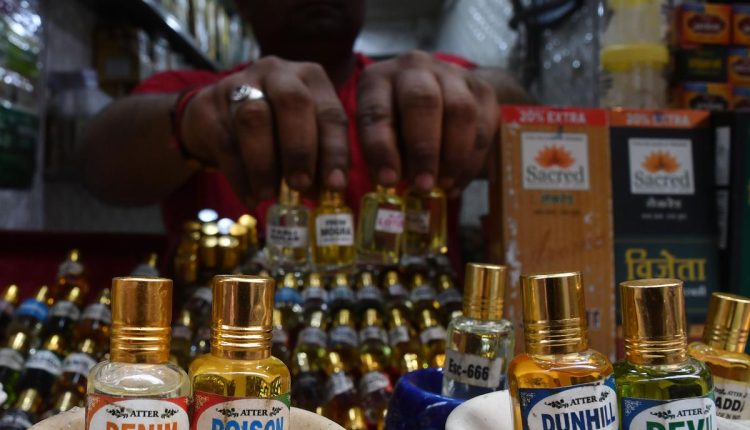Attar on display in a shop in Chandni Chowk.
| Photo Credit: Sushil Kumar Verma
For over 200 years, Gulabsingh Johrimal, a tiny shop in old Delhi’s Chandni Chowk has been serving a steady stream of connoisseurs from across the globe looking for ruh and attar made from flowers, woods, herbs and spices.
The shop was set up in 1816 by Lala Gulab Singh, an entrepreneur from Jhajjar in Haryana, and his son Gulab Gundhi after they migrated to Delhi.
Kunal Gundhi, an eighth-generation owner, claims their attars donned the sherwanis of Mughal emperor Bahadur Shah Zafar and iconic Urdu poet Mirza Ghalib. “Our favourites — Khalifa, Mukkhalat, White Oud, Ameeri Oud, and Royal Oudh — are stored in special Belgian-cut jars. Wearing attar is a tradition in most families here. It grows on you and becomes a part of your lifestyle,” he says.
Gulabsingh Johrimal is one of the several family-run attar shops in the city whose business is flourishing despite the emergence of deodorants. One major reason for this is a rise in the demand for alcohol-free fragrances made from floral extracts and natural herbs. Other is the emergence of online shopping. Attar shop owners say they are expanding their product lineups, customising and tweaking their age-old traditional formulas to suit the changing demands of their customers.
Business going strong
Abdul Rashid, the manager of Abdul Ghani Mohd Ismail perfumes, an attar shop founded in Chandni Chowk back in 1904, says there has been a rise in the attar business in the last 20 years.
“The new age deodorant industry did not impact us because we have loyal customers who trust our products. We don’t use synthetic chemicals, only natural pressed oils that last longer than deodorants,” says Mr. Rashid.
Mr. Kunal Gundhi points out that until three decades back, the variety and demand for attars were limited. “Now we have expanded our portfolio of fragrances, introduced newer varieties as the market has gone online, helping our sales increase manifold,” says Mr. Gundhi.
In Connaught Place’s Palika Bazar, 43-year-old Jain Perfumes is stocked with tiny glass bottles of exquisite perfumes. The store manager Nikhil Jain says that a majority of customers now prefer using alcohol-free perfumes. “After trying out imported perfumes and deodorants, customers are now returning in large numbers for organic floral extracts and natural herbs. After all, deodorants might be easy to apply but are harsh on the skin,” he said.
Changing demands
Mohammad Sabir, a sixth-generation proprietor of 54-year-old ‘Attar House Perfumes’, located near Jama Masjid, says the attar market stays relevant by keeping itself abreast of the latest market trends.
“Companies are tweaking the age-old traditional formulas and reinventing their products to recreate newer lines of perfumes without compromising on purity and quality,” says Mr. Sabir.
The shop manager of ‘Al Noor Attar House’ in Nizamuddin says nearly 70% of their buyers are people from the Muslim community who prefer wearing non-alcoholic fragrances.
“Natural fragrances such as khas, shamama, oudh, gulab and chameli have a huge market,” says Noman Zia. “Earlier customers preferred strong attars. These days they come asking for mellowed fragrances. Gulab and kaccha bela are the hot favourites these days,” Mr. Zia adds.
Competing with French perfumes
The attar manufacturers keep tweaking their blends and compositions to fight the competition by French perfumes. Farhat Moin, manager at ‘Al Madni Perfumes’ in Shaheen Bagh, says that the French perfumes penetrated the market in a big way but could not really dent the market for attar.
“We are constantly researching and understanding the notes of French perfumes to cater to the demands of our customers. They often ask us to recreate attar from French perfumes and we customise it for them,” she said.
When customers want mellow French perfume-based attars, we ask for the samples of the perfumes and create blends with the aromas of our attars,” Mr. Gundhi adds.
“When new companies launched roll-ons, attar companies were quick to adapt and introduce roll-on attars. Then came the spray scents and again we again reintroduced and repackaged our products to meet the demands of our buyers,” says Mr. Sabir.


